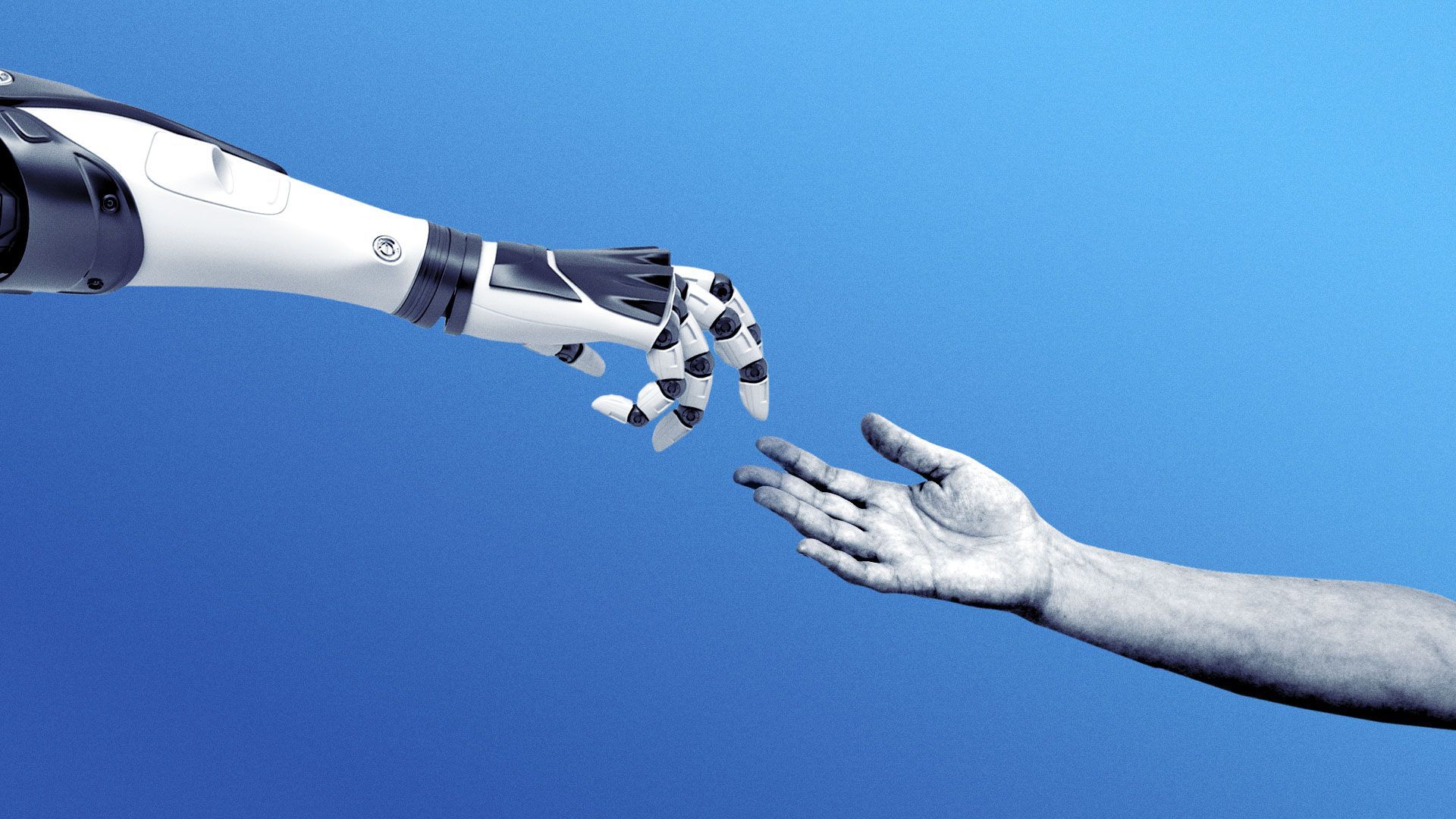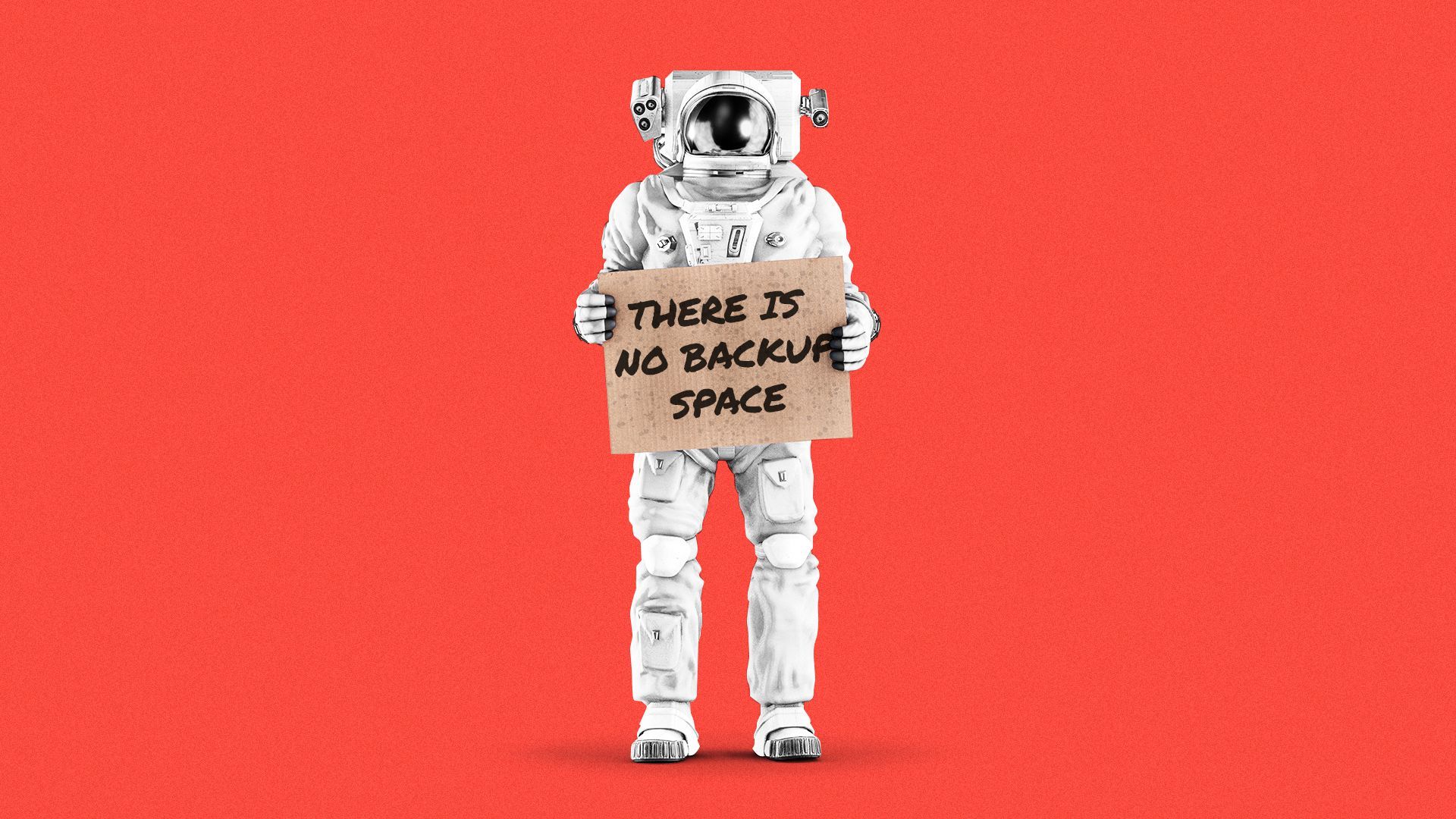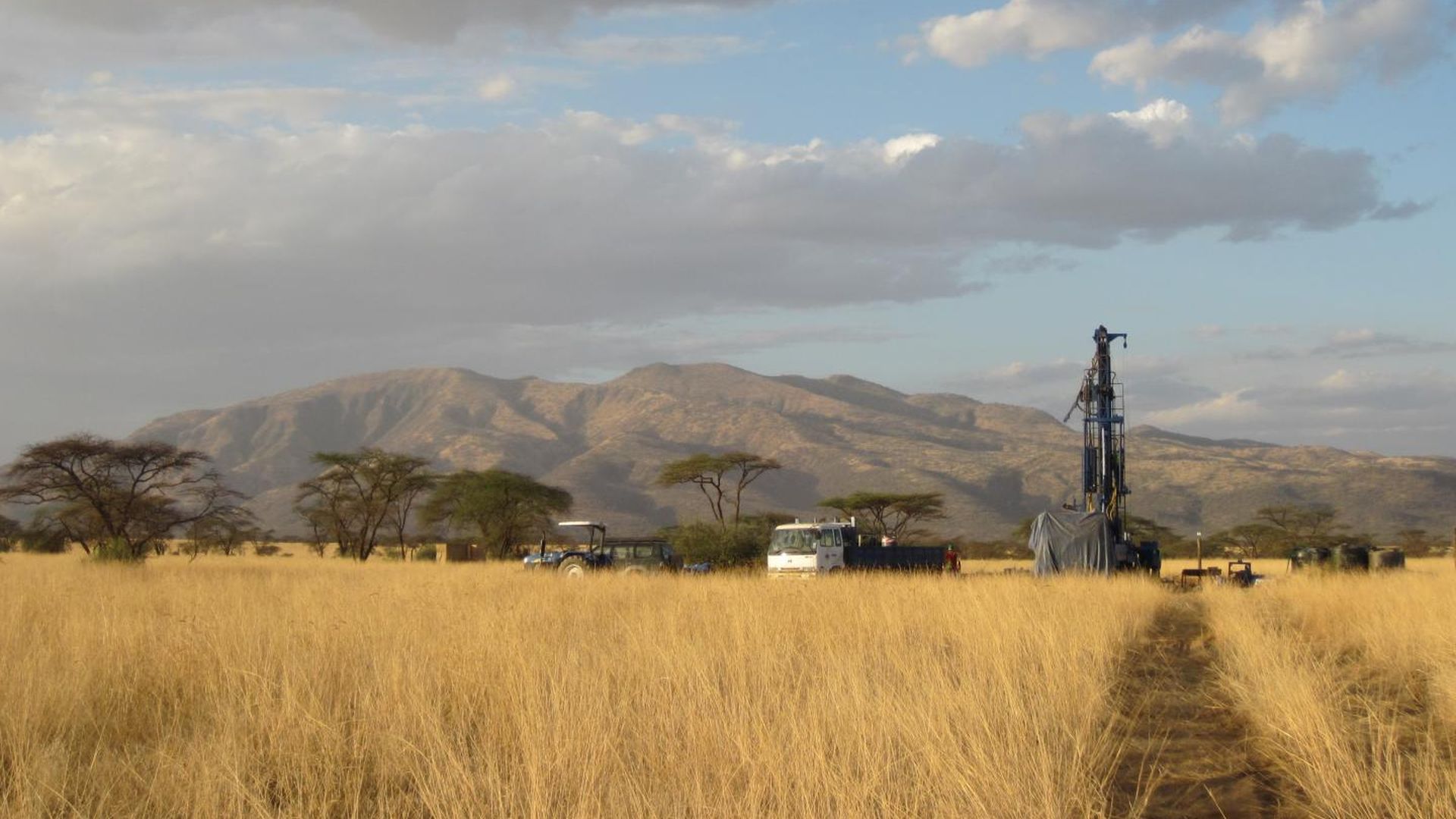| | | | | | | Presented By WeWork | | | | Axios Future | | By Bryan Walsh ·Oct 21, 2020 | | Welcome to Axios Future, which unlike Twitter this week is 100% free of terrible Zoom puns. New: Axios is launching a five-part video "short course" series on 5G to get you up to speed on what it is, who is involved and why it matters. Sign up for the free course HERE! Today's Smart Brevity count: 1,698 words or about 6 minutes. | | | | | | 1 big thing: Biology is having its industrial revolution |  | | | Illustration: Sarah Grillo/Axios | | | | Bioscience research is undergoing a wave of automation and digitization, turning a manual, laborious practice into a true industry. Why it matters: Biotechnology promises to revolutionize everything from medicine to energy, but for that to happen, the field needs to move out of the traditional lab and into something resembling a foundry. The growth of robotics and cloud-based remote research can help make that happen. What's happening: In a report published last week, the design and engineering firm Arup made the case that the future of scientific labs will increasingly be automated and digitized, allowing researchers to carry out experiments remotely and scale up their work faster. - "Digitization is changing all of our lives, and it's also changing how we do science," said Jennifer DiMambro, Arup's science and business leader for the Americas, in an online event for the report. "We're moving away from designing labs for people to designing them for the tools we use."
How it works: That means labs where experiments can be automated — think robot arms moving vials en masse, rather than overworked graduate students pipetting by hand. - Smart facilities can track everything done in a lab, automating data collection that in the past might have been kept on pad and paper and allowing researchers to maximize workflow.
- Virtual remote labs can be accessed via the cloud, providing on-demand services for sequencing DNA, carrying out reactions and other experiments that can be quickly spun up according to a researcher's needs.
- "We now have customers who can leverage robots to do a thousand experiments at once that in the past would have been done manually," says Saji Wickramasekara, the CEO of the cloud-based informatics platform Benchling. "You can get far more scale."
Of note: Benchling, which helps life science researchers remotely track and share data, has seen a 35% increase in platform use from customers working on COVID-19. - "COVID-19 has really been a forcing function to put the gas pedal down on change and modernize this field," says Wickramasekara.
Zoom in: Speed and industrialization in the lab are particularly vital for developing a COVID-19 vaccine in record time. - Ginkgo Bioworks, a Boston-based synthetic biology startup that writes more DNA than any other firm in the world, has lent its platform infrastructure to Moderna to optimize the manufacturing of key ingredients for that company's mRNA vaccine.
- Ginkgo invested $400 million over the past five years to build a 100,000-square-foot automated bioengineering facility that more closely resembles a biological factory than a traditional lab.
Context: Ginkgo Bioworks, which is now valued at more than $4 billion, represents the cutting edge of biotech industrialization. - Rather than producing final products itself, Ginkgo designs and engineers custom-made microbes for customers ranging from fragrances to food flavors to pharmaceuticals.
- "Our role is helping to improve the manufacturing process," says Jason Kelly, Ginkgo's CEO. "That means faster vaccine development, faster drug development, faster everything."
What's next: Yesterday, the Department of Defense announced it would award $87.5 million — which will be matched by more than $180 million in non-federal funding — to establish a manufacturing innovation institute called BioMADE at the University of Minnesota. - BioMADE aims to "bridge the gap between lab-scale research and at-scale manufacturing," Douglas Friedman, the CEO of BioMADE, said in a statement.
The bottom line: If the 21st century really is going to be the "age of biology," as some experts have predicted, the field needs to undergo its own version of the Industrial Revolution. |     | | | | | | 2. Why we confide in robots |  | | | Illustration: Eniola Odetunde/Axios | | | | New forms of "empathetic computing" are helping human users feel more comfortable in opening up to a program. Why it matters: Our mental health has taken a major hit during the COVID-19 pandemic, while social distancing means it's harder to meet in person with therapists. That has opened a space for emotionally attuned machines to help us. By the numbers: A survey of thousands of employees and executives released earlier this month by Oracle and the HR research and advisory firm Workplace Intelligence found 68% of people reported they would prefer to talk to a robot over their manager about stress and anxiety at work. - 80% said they were open to having a robot as a counselor or therapist.
- "Workers said that robots can support their mental health better than humans because they can provide a judgment-free zone," says Dan Schawbel, managing partner of Workplace Intelligence.
Of note: In April, the FDA suspended many of its rules for digital therapeutic devices for psychiatric disorders because of the pandemic, which led to an increase in doctors prescribing new forms of digital therapy. What's happening: Last month Maslo.ai, a startup that works on AI-driven empathetic computing, released new open-sourced toolkits that allow developers to build apps to address mental health. - Maslo uses signal processing techniques to "read" voice, text and even the body language of a human user to identify a baseline level for mental health.
- "We can extract the linguistic aspects of what a person is saying, but we can also look at acoustic elements as well — volume, loudness, intonation," says Ross Ingram, Maslo's CEO.
- That data can help Maslo's partners build better executive performance coaches, for example, or even help with online dating.
Between the lines: A study by researchers at Maslo and the University of British Columbia found that while robots overall were seen by humans as having significantly weaker qualities of mind compared to people, younger users were much more likely than older generations to see machines as potentially capable of processing emotions. Reality check: AI cannot yet feel or process emotions in any real way, which limits the effectiveness of therapeutic robots. My thought bubble: Personally, I'd rather talk to my manager than a robot about stress and anxiety at work, but I have a really good manager. |     | | | | | | 3. Postponing the jobs of the future |  Data: Cognizant; Chart: Andrew Witherspoon/Axios Many of the digital jobs of the future have suffered during the later stages of the pandemic, while in-person health care jobs are on the rise. Why it matters: Automation and digitization will profoundly change the U.S. labor market, but that future has been delayed as COVID-19 forces companies to shift into survival mode. By the numbers: The consulting firm Cognizant this week released the third-quarter numbers for its Jobs of the Future Index, which tracks the emergence of new jobs in the digital and automated economy. - For the first time since the index was launched at the end of 2016, postings for jobs of the future declined in the third quarter while job postings overall rose.
- Jobs in the algorithms, automation and AI family fell by 13.2% in Q3, while jobs in the fitness and wellness family rose by 42.8%.
- Home health aide grew by nearly 300% year-on-year, as the pandemic increased demand for health care at home, while health information manager/director fell the most over the year, declining by 56%.
Flashback: Early assumptions — including by me — were that the pandemic would accelerate the adoption of automation, but the sheer economic carnage means that change hasn't yet been reflected in jobs. What they're saying: "The jobs of the future are collateral damage of the pandemic," says Robert Brown, vice president at Cognizant's Center for the Future of Work. "American companies are focused on keeping the lights on rather than investing in digital growth." Yes, but: This doesn't mean the disruptive effects of automation and AI have been postponed permanently. The bottom line: Don't drop out of that AI course yet. |     | | | | | | A message from WeWork | | The big changes coming to your workplace | | |  | | | | COVID-19 has transformed the way people think about work. What's now top of mind: - Spaces that foster collaboration while prioritizing wellbeing.
- Offices that flex to the demands of a variable world.
- Freedom for employees to work where they want.
WeWork reveals what this could look like. | | | | | | 4. New space war: Environmental crisis |  | | | Illustration: Aïda Amer/Axios | | | | There's a new, once-unthinkable frontier in the battle over environmental regulation: outer space, Axios Space author Miriam Kramer writes. - Why it matters: Space junk clutters orbits and poses an urgent threat to weather, security, communications and other satellites. Long term, you can't live or work in space if trash is literally slamming into you.
Moriba Jah of the University of Texas at Austin said the space industry has a lot to learn from the environmental movement, including borrowing the language of sustainability to bring the problem down to Earth. - "Whatever narratives we have for maritime, land and air, these environmental protection narratives need to have, 'and space,'" Jah said.
- Keep reading.
🛸 Sign up for Miriam's newsletter, Axios Space. |     | | | | | | 5. Worthy of your time | | Artificial general intelligence: Are we close, and does it even make sense to try? (Will Douglas Heaven — MIT Tech Review) - An in-depth guide to the past, present and future of artificial general intelligence, which would be the most important invention in human history — provided it's even possible.
Travel influencers, meet authoritarians (Krithika Varagur — Rest of World) - Autocratic leaders have continued to cultivate celebrity travel influencers, even as their influence over a more skeptical public is beginning to wane.
Audio's opportunity and who will capture it (Matthew Ball) - A very long post about the history and future of advertising on audio of all forms, from the acknowledged expert on all things streaming media.
"Machines set loose to slaughter": the dangerous rise of military AI (Frank Pasquale — The Guardian) - A long piece arguing that unregulated autonomous weapons — "slaughterbots" — represent an existential threat to humanity.
|     | | | | | | 6. 1 hopeful thing: How humans adapt |  | | | The drill site at the Koora Basin in Kenya. Photo: Human Origins Program, Smithsonian | | | | Environmental and climatic change in Africa hundreds of thousands of years ago drove human beings to adopt more sophisticated tools and broaden their trade networks, according to a new study. Why it matters: Human beings possess no more important trait than our adaptability, which has enabled us to thrive in nearly every corner of the globe. With environmental and other changes coming at us swiftly, we'll need that adaptability even more in the future. What's happening: In a study published Wednesday in Science Advances, researchers analyzed the results of a sedimentary drill core that represented 1 million years of environmental history in the East African Rift Valley. - Previous archaeological research found early humans in the area had used the same rudimentary stone axes for hundreds of thousands of years.
- The drill core results showed the region began experiencing serious environmental and tectonic change about 400,000 years ago.
- Beginning around 320,000 years ago — and likely prompted at least in part by those changes — humans in the region upgraded to more sophisticated tools and weapons and began employing early symbolic communication.
What they're saying: "We conclude that the roots of Homo sapiens' evolutionary adaptations stem from our ability to adjust to environmental change," writes lead author Richard Potts, director of the Human Origins Program at the Smithsonian Institution, in The Conversation. What's next: Climate change, and lots of it, which will put our adaptiveness to the ultimate test. "As humanity now confronts an era of environmental uncertainty on a global scale, is our species sufficiently nimble to engage social networks, new technologies, and reliable sources of information to adjust to the environmental disruptions ahead?" — Richard Potts |     | | | | | | A message from WeWork | | How to future-proof your office | | |  | | | | How can companies avoid fixed costs in a variable world? A solution: WeWork's flexible terms empower businesses with short-term commitments and workspaces that can scale to their ever-evolving needs. WeWork can help your business stay ahead. | | | | | | Axios thanks our partners for supporting our newsletters.
Sponsorship has no influence on editorial content. Axios, 3100 Clarendon Blvd, Suite 1300, Arlington VA 22201 | | | You received this email because you signed up for newsletters from Axios.
Change your preferences or unsubscribe here. | | | Was this email forwarded to you?
Sign up now to get Axios in your inbox. | | | | Follow Axios on social media:    | | | | | |








No comments:
Post a Comment